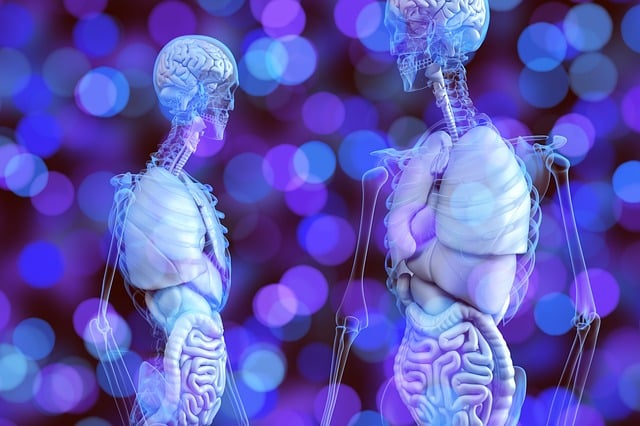The Endocannabinoid System (ECS), discovered in the late 1990s, is a complex biological mechanism that maintains homeostasis in mammals by regulating mood, appetite, memory, pain, and immune response. Consisting of endocannabinoids like anandamide, receptors (CB1 and CB2), and enzymes, it modulates physiological processes through interactions with both internal endocannabinoids and externally derived cannabinoids like THC and CBD from cannabis. Disruptions in the ECS have been linked to various health conditions, presenting therapeutic potential for treatments ranging from chronic pain to anxiety disorders. Understanding the ECS is crucial for harnessing its natural healing mechanisms and developing personalized medicine.
“Unraveling the mysteries of the Endocannabinoid System (ECS) is key to understanding why cannabis affects mammals the way it does. This complex biological system, present in all mammals, plays a pivotal role in maintaining homeostasis—the body’s internal balance. With its primary role in regulating mood, appetite, pain sensation, and memory, the ECS has garnered significant interest for its potential health benefits. This article delves into the intricate workings of the ECS, exploring its impact on mammal biology, current research, and future therapeutic applications.”
An Overview of the Endocannabinoid System

The Endocannabinoid System (ECS) is a complex biological system found in all mammals, playing a pivotal role in maintaining homeostasis—the body’s internal balance. It was discovered relatively recently, in the late 1990s, and has since been at the forefront of research due to its profound effects on various physiological processes. The ECS consists of endocannabinoids (eCBs), receptors, and enzymes that work together to regulate functions such as mood, appetite, memory, pain perception, and immune response.
Understanding the ECS is crucial in comprehending how cannabis interacts with our bodies. The most well-known endocannabinoid is anandamide (AEA), which is produced on-demand by the body and acts as a messenger between cells. When binding to specific receptors, such as CB1 and CB2, it triggers various cellular responses. This system’s dynamic nature allows for fine-tuned adjustments to keep the body functioning optimally, making it a key player in both normal physiological processes and pathologies.
The Role of Cannabinoids in Mammal Biology

Cannabinoids play a crucial role in the biology and physiology of all mammals, with the endocannabinoid system (ECS) serving as a vital regulator of various physiological processes. This complex system involves endocannabinoids, receptors, and enzymes that work together to maintain homeostasis, or balance within the body. Understanding the ECS is essential because it influences functions such as mood, memory, pain sensation, appetite, and even immune responses.
The ECS is designed to interact with cannabinoids produced both internally by the body (endocannabinoids) and externally through plant-derived compounds like THC and CBD found in cannabis. This interaction helps modulate various biological activities, ensuring optimal functioning. Imbalances or dysregulation of the ECS have been linked to numerous health conditions, highlighting the potential therapeutic benefits of targeting this system for treatment.
Endocannabinoid System and Its Regulation

The endocannabinoid system (ECS) is a complex biological system that plays a crucial role in maintaining homeostasis, or balance, within the body. It’s a network of receptors, enzymes, and molecules known as endocannabinoids that help regulate various physiological processes, including appetite, pain sensation, mood, memory, and immune function. Understanding the ECS is essential to grasping how cannabis interacts with our bodies, as its effects are mediated through this system.
The ECS is intricately involved in regulating inflammation, which is a key mechanism by which it maintains balance. When the body experiences injury or stress, the ECS is activated to suppress inflammation and promote healing. This intricate system ensures that bodily functions operate harmoniously, providing a foundational framework for overall health and well-being.
Health Benefits of the Endocannabinoid System

The Endocannabinoid System (ECS) is a complex cellular system found in all mammals, playing a crucial role in maintaining homeostasis, or the body’s internal balance. By regulating various physiological processes, including pain sensation, appetite, mood, memory, and immune function, the ECS contributes significantly to overall health and well-being. Understanding the ECS is essential as it acts as a bridge between our bodies and the plant compounds found in cannabis, known for their potential therapeutic effects.
Through a series of receptors and endocannabinoid molecules, the ECS helps modulate inflammatory responses, reduces anxiety and depression, stimulates appetite, and promotes sleep. The discovery and study of this system have opened new avenues for medical research, leading to the development of treatments for conditions such as multiple sclerosis, chronic pain, and certain forms of epilepsy. By harnessing the power of the endocannabinoid system, we can uncover innovative ways to support our bodies’ natural healing mechanisms.
Exploring Cannabinoid Receptors in Mammals

The endocannabinoid system (ECS) is a complex physiological system found in all mammals, playing a pivotal role in maintaining homeostasis—the body’s internal balance. It consists of endocannabinoids (endogenously produced cannabinoids), cannabinoid receptors, and enzymes that synthesize and degrade these compounds. Understanding the ECS involves delving into its two primary receptors: CB1 and CB2. CB1 receptors are predominantly located in the central nervous system, while CB2 receptors are primarily found in the immune system and peripheral organs. These receptors interact with endocannabinoids like anandamide and 2-AG, which modulate various physiological processes, including pain sensation, appetite, memory, mood, and inflammation.
Research into the ECS has revealed its significance not only in maintaining normal bodily functions but also in pathological conditions. Disruptions in the ECS have been linked to numerous diseases, such as chronic pain, neurodegenerative disorders, autoimmune diseases, and metabolic conditions. Exploring cannabinoid receptors further opens avenues for therapeutic interventions, offering potential treatments for these diverse range of ailments. The discovery and ongoing study of the endocannabinoid system continue to revolutionize our understanding of mammalian biology and hold great promise for future medical advancements.
The Impact of Cannabis on the Endocannabinoid System

Cannabis has a profound impact on the endocannabinoid system (ECS), a complex network of receptors and endogenous compounds found in all mammals. The ECS plays a crucial role in regulating various physiological processes, including appetite, pain sensation, mood, memory, and immune function. When cannabis is consumed, its primary active compounds, tetrahydrocannabinol (THC) and cannabidiol (CBD), interact with the ECS. THC binds to CB1 receptors in the brain, leading to psychoactive effects and potential short-term impacts on cognitive functions and memory. On the other hand, CBD does not bind directly to CB1 or CB2 receptors but modulates the ECS by influencing the production and activity of endocannabinoids, such as anandamide and 2-AG.
Understanding the ECS and its interaction with cannabis compounds is essential in appreciating the therapeutic potential of this plant. Research suggests that dysregulation of the ECS has been linked to numerous health conditions, including chronic pain, inflammation, anxiety, and neurodegenerative disorders. By interacting with the ECS, cannabis may offer relief for these conditions through anti-inflammatory, analgesic, and anxiolytic effects. However, it’s important to note that while cannabis shows promise, further research is needed to fully comprehend its complex interplay with the endocannabinoid system and its implications for human health.
Future Research and Therapeutic Potential

As we uncover more about the endocannabinoid system (ECS), future research holds immense therapeutic potential. The ECS plays a pivotal role in regulating various physiological processes, and its disruption is linked to numerous health conditions. Targeting this system could offer novel treatments for pain management, anxiety disorders, inflammatory diseases, and even neurodegenerative conditions. Understanding how cannabinoids interact with the ECS can lead to the development of more effective and personalized medicine.
Further exploration is needed to unlock the full capabilities of this intricate system. Research into the complex relationship between cannabinoids and the ECS may result in groundbreaking treatments, improving quality of life for patients suffering from a range of ailments.
